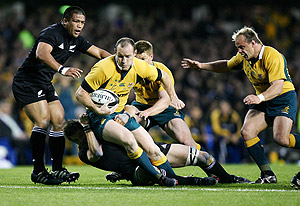
Stirling Mortlock on the attack against the All Blacks. AAP Photos
According to Wayne Smith, the chief rugby writer for The Australian, Mortlock was not told before the axe fell that he was going to be chopped off from the captaincy of the Wallabies on their 2009 Spring Tour. He had a good idea, though, that this execution was coming.
When the new leadership team for the Wallabies was fronting the media, he was at the movies with his kids.
Greg Growden, the chief rugby writer for The Sydney Morning Herald, has pointed out that Mortlock was “surprised” to lose the captaincy and concerned “about the official lines of communication.”
But Growden goes on to point out that the excuse used by Mortlock’s supporters that he was at odds with the ARU over Lote Tuqiri’s dismissal from the Wallabies does not hold up.
Mortlock, according to Growden (and he is correct in this), was given a full briefing by the ARU of the Tuqiri dismissal. Mortlock then “told officials he agreed with the ARU’s decision.”
The problem for Mortlock after this, though, is that he did not unequivocally express this view to the rugby media. Talking to journalists, Mortlock tended to concentrate on the negative effect the Tuqiri dismissal had (supposedly, my word, not his) on his fellow Wallabies.
Growden, from what I know about the raging politics of Australian rugby is – once again – spot on with his assessment that the overriding factor behind the decision of Robbie Deans was to change the culture of the Wallaby squad by de-powering and not selecting in a couple of cases “the disaffected few.”
This decision meant bringing in a new leadership of the team.
Mortlock was seen to be too closely aligned to the “disaffected few” and to some former senior Wallabies who are heavily involved with the players’ union, RUPA.
For reasons going back to the early days of professionalism, when John O’Neill tried to claw back some of the excessive payments the players had screwed out of the ARU, RUPA and some of the senior players began an obsessive quest to get rid of O’Neill.
The best way of describing this nasty situation is to describe O’Neill and the ARU as the government and RUPA as a belligerent opposition determined to sweep the government out of office and set itself and its mates up as the controllers of the game.
Complicating all of this has been a very bitter group of Queensland officials who did not take kindly to O’Neill’s initial efforts to get rid of people he thought were holding back his efforts to push Australian rugby out of the mess he had inherited when he first became the ARU’s CEO.
The 1999 Rugby World Cup victory crowned O’Neill’s first stint as the ARU’s CEO.
The victory was achieved by the officials (O’Neill), the coach (Rod Macqueen) and the captain of the Wallabies (John Eales) all working together for the common good of the Wallabies. I called this trio Australian rugby’s “holy trinity.”
On his second round as the ARU’s CEO, O’Neill is trying to replicate another “holy trinity.”
He chased and snared Deans after the NZRU rather foolishly rejected him in favour of the failed incumbent Graham Henry. Now, with Rocky Elsom, he has a captain who is aligned with the ARU (remember Elsom was given special permission to spend a season in Ireland), rather than with the RUPA elements.
Mortlock’s problems with holding on to the captaincy of the Wallabies were further complicated by his age (32), his increasing tendency to get injured and, therefore, the fears that he will not be around for the 2011 World Cup.
Mortlock compounded these fears by making a trip to Japan to sound out playing there while he was injured and missed several Tri-Nations Tests.
Deans’ fears about whether Mortlock will make it through to 2011 are no doubt reinforced by the memory of the 2003 RWC tournament when he was assistant coach for the All Blacks and Tana Umaga his form centre broke down. Umaga always insists that he could have played in the semi-final against Australia.
But the gamble to play him was not taken.
Leon MacDonald, who had never played centre in Test rugby, was selected instead. MacDonald missed a cut-out pass 10m out from the Wallaby tryline early on in the match.
The pass was intercepted and the opposing Wallaby centre raced away for the match-defining try.
That player, the great interceptor, was Stirling Mortlock. This was his greatest moment as a Wallaby and the ultimate reason why he later was made captain, in my opinion.
These sort of heroics are beyond Mortlock now.
He gives size to a small Wallaby backline, admittedly, and experience and strong defensive capabilities. However, he is now a match-saver rather than a match-winner.
The captain of the Wallabies has to be assured of his place in the team. Mortlock is reaching that awkward late stage in his career where his lack of pace and a series of injuries are limiting his effectiveness as a dynamic presence on the field.
He is still an asset for the Wallabies. But for how much longer?
By dropping him from the captaincy, Deans has really put Mortlock on notice that he is still wanted in the squad. However, if his form slips further, or if someone in the squad really impresses in the centres (Rob Horne, perhaps?), then the axe will fall on his Wallaby spot, too.
In the end, Mortlock lost the Wallaby captaincy because his position in the Wallaby run-on side is no longer a certainty as it has been for virtually all of his distinguished career.





























































































